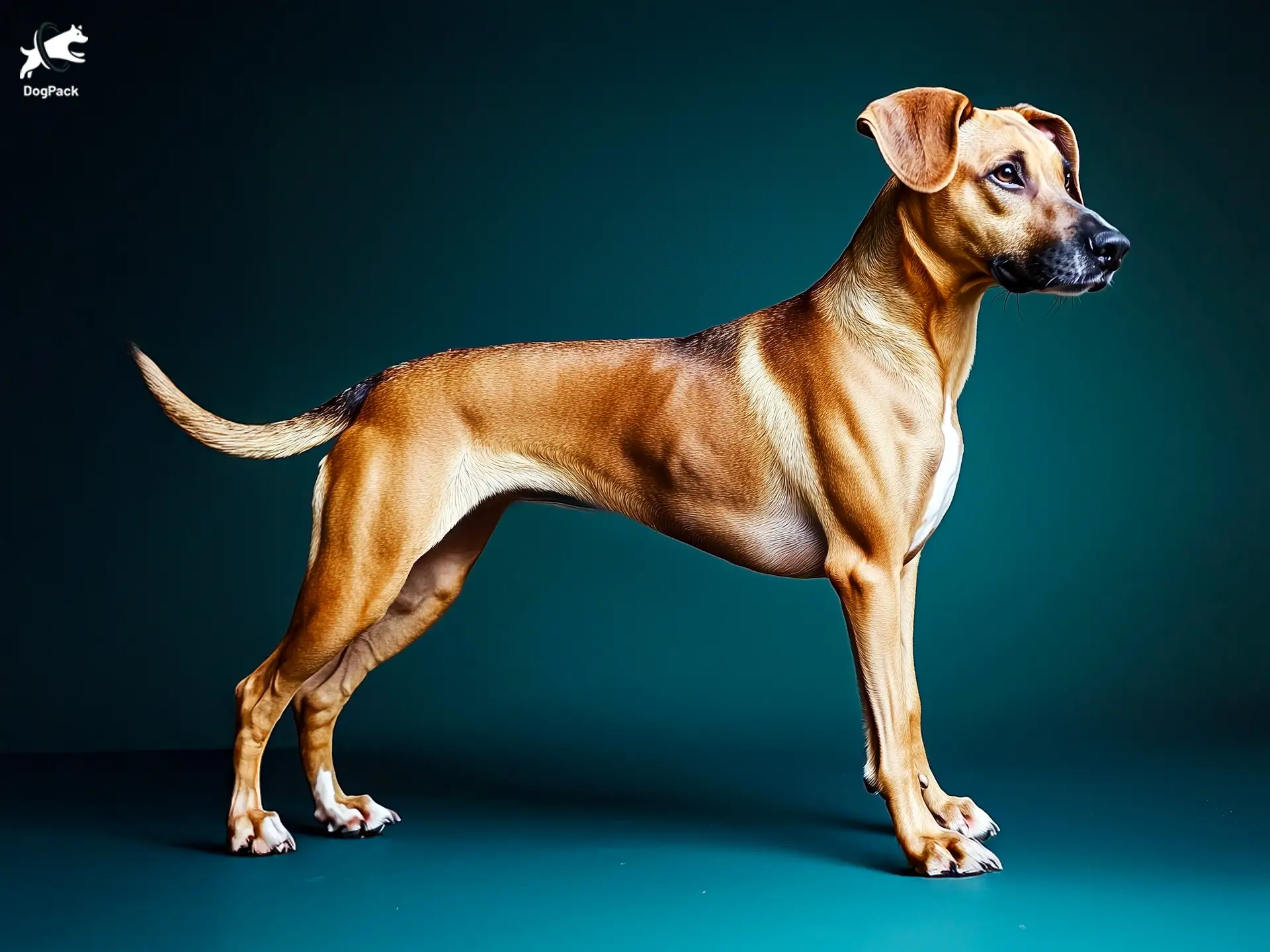Royal Bourbon Dog Breed Info & Overview
These mixed-breed dogs originated on La Réunion—formerly known as Île Bourbon—where they’ve thrived for centuries. Renowned for their athletic build and loving temperament, they’re often considered hidden gems by dog enthusiasts. From possible African lineage to their local moniker “Royal Bourbon,” these medium-sized canines have captured hearts both on the island and abroad with their friendliness and resilience.
Characteristics
Pictures
Breed History
The Royal Bourbon traces back to the very first settlers on La Réunion, when the island was still known as Île Bourbon. As people arrived, so did their dogs, creating a melting pot of canine genes that shaped this athletic, medium-sized companion. Over generations, they adapted to local conditions, growing into robust dogs celebrated for their energy, versatility, and understated elegance.
A notable influence may stem from African breeds like the Rhodesian Ridgeback, suggested by the Royal Bourbon’s muscular build and short coat. Some experts also point to ties with the Africanis or Indian pariah-type dogs. Rather than deliberate selective breeding, natural selection on the island favored dogs that thrived in tropical climates and social living situations, leading to their hardy constitution.
Though they’re not recognized by formal kennel clubs, Royal Bourbon dogs hold cultural significance in Réunion. Their name, “Royal,” nods to the island’s old moniker, honoring a heritage that’s both practical and historically rich. Sadly, surpopulation has led to high euthanasia rates at local shelters, making dedicated rescue work crucial for preserving the breed’s legacy and charm in the modern era.
Temperament, Personality
These dogs typically exhibit an even, friendly disposition and a zest for life. They adapt well to family settings, enjoying lively games and gentle interactions. Their natural sociability means they bond quickly with those who treat them kindly, offering loyalty and affection in return. Despite their street origins, many Royal Bourbons transition effortlessly into household companions.
Confident yet never belligerent, they rarely show aggression when properly socialized. With strangers, they might be a bit reserved at first, but once they sense no threat, they’ll warm up, eager for a pat or a treat. Their intelligence helps them read human cues, making them surprisingly intuitive about who’s friend or foe—excellent qualities for a capable family guardian.
When children are involved, a Royal Bourbon generally shines, showing patience and a playful spirit. Supervised introductions to toddlers are recommended to ensure boundaries are respected on both sides. They thrive on close-knit relationships and respond to calm, confident leadership, making them treasured companions for anyone seeking a loving yet modest canine friend.
Physical Characteristics
Though appearances vary, most Royal Bourbon dogs sport a lean, athletic frame with short or medium coats. Colors often range from fawn and black to variegated patterns influenced by their diverse ancestry. Their physiques reflect both the tropical environment of La Réunion and the sturdy heritage from African or other lineages, favoring agility and endurance over ornamental traits.
Strong, well-formed legs lend to a quick gait, whether navigating the island’s rugged terrain or enjoying a casual run at the beach. Some show a striking resemblance to the Rhodesian Ridgeback in coat color and body proportions, although the trademark ridge is typically absent. Nevertheless, their poised stance and alert expressions hint at a confident nature ready for exploration.
Royal Bourbon dogs often have expressive eyes and softly folded or semi-pricked ears, giving them an inquisitive look. Their stature is manageable, standing roughly 20 to 28 inches and weighing between 40 and 70 pounds. This moderate size allows them to adapt to varied living conditions, from island life on Réunion to more urban locales where they’ve been welcomed as family pets.
Health Issues
Thanks to a broad gene pool, these canines usually enjoy robust health. Yet, like any mixed-breed dog, they can experience issues such as hip dysplasia or skin irritations, particularly if they live in harsh outdoor conditions. Regular checkups allow early detection and keep them at their best, helping prevent minor irritations from becoming big problems.
On La Réunion, parasitic infections can be a concern, especially for stray or free-roaming dogs. A standard vaccination and deworming schedule is key for a Royal Bourbon living anywhere—preventive care is often easier and less expensive than treatment after illness sets in. Monitoring their coat and checking for fleas or ticks also helps ensure they remain healthy and comfortable.
As with other medium-sized dogs, watch for signs of joint stress or digestive issues. Offering consistent exercise without overexertion is ideal, especially as they age. While not plagued by many inherited diseases, periodic vet exams, a balanced diet, and prompt attention to any behavioral changes keep them vibrant. Their resilience is a hallmark, but proactive healthcare truly makes a difference.
Grooming Needs
These dogs generally have lower grooming demands than many other medium dog breeds. A weekly brushing removes loose hairs and helps distribute natural oils for a shiny coat. Because their fur is typically short, matting is rarely a concern—just a quick run-through with a soft-bristle brush can keep them looking tidy.
Baths can be limited to once every couple of months unless they romp through mud or saltwater. A gentle, pet-safe shampoo prevents skin dryness while removing dirt and potential allergens. After a good rinse, ensure they dry thoroughly, especially in humid climates where moisture can linger and encourage mild skin problems.
Routine nail trims and ear checks round out the grooming regimen. Trim nails when they click on floors or look overgrown. Clean their ears carefully with veterinarian-approved products to reduce the risk of infection, particularly if they enjoy frequent beach outings. This minimal grooming approach complements their active lifestyle and helps maintain their characteristic island-dog ease.
Exercise Requirements
Emerging from a tropical, outdoor-focused environment, Royal Bourbons thrive on daily activity. A brisk walk or jog, paired with some mental stimulation, often suits them well. Although not every dog demands endless miles, an hour or two of moderate exercise ensures both physical health and mental well-being. This also keeps destructive tendencies in check.
They enjoy interactive play, such as fetch or short agility drills. If you have a safe, fenced area, consider letting them roam leash-free to burn off energy. Because they’re naturally curious, exploring varied terrain or encountering new scents can bring them joy while honing their keen instincts. Supervision helps avoid mischief if they catch sight of small animals.
Be mindful of hot weather, especially on sunny days. Offer plenty of shade and water, and schedule high-energy activities for cooler mornings or evenings. If you’re near a beach or a lake, a swimming session can be a fantastic way for a Royal Bourbon to stay active without overheating. This balance of physical and mental stimulation fosters a happy, well-rounded dog.
Training Tips
These dogs respond beautifully to reward-based, patient methods. Having survived or thrived in varied environments, they’re naturally resourceful. Harsh training tactics typically backfire; instead, focus on positive reinforcement with treats or praise. Begin with basic commands—sit, stay, come—to establish a shared language before tackling more advanced lessons.
Socialization is crucial, particularly for dogs rescued from the streets or shelters where negative experiences may have left them cautious. Gradually exposing them to different people, sounds, and environments builds confidence and prevents anxiety. Once comfortable, they demonstrate keen intelligence, picking up new tasks quickly and often relishing the chance to show off.
Short, focused sessions help maintain their interest. Breaking training into ten-minute intervals or incorporating “mini-challenges” during daily walks engages their bright minds. If they sense consistent leadership and clear boundaries, they’re more than willing to please. Over time, these dogs can excel at fun activities like trick training or dog sports, reflecting the remarkable adaptability that defines the Royal Bourbon.
Nutrition, Diet
Due to their active background, Royal Bourbon dogs typically thrive on high-quality kibble rich in protein (around 25% or more). Aim for premium formulas that include lean meats such as chicken, fish, or lamb. They benefit from a moderate fat content to sustain energy, especially if they frequently engage in outdoor play or long walks.
Adults often do well on roughly 2 to 2.5 cups of food per day, split into two meals: morning and evening. However, particularly energetic individuals might require a slight increase, while less active dogs could need a reduction to prevent weight gain. Provide fresh, cool water at all times—especially in hotter climates—so they remain well-hydrated.
Some owners incorporate local produce, such as cooked squash or green beans, to add vitamins and fiber. Always introduce new foods slowly to gauge any sensitivities. If a dog exhibits itchiness or digestive upset, consult a vet regarding potential food allergies or specialized diets. Ensuring consistent meal times and portion control keeps your Royal Bourbon in prime shape.
Adoption, Breeders
Because Royal Bourbon dogs are not a recognized breed, few, if any, formal breeders exist. Instead, rescue organizations on La Réunion, such as Espoir Réunion or SOS Animaux Réunion, work tirelessly to rehome these dogs. Many are found as strays and fostered by volunteers until suitable families come along.
Overpopulation on the island remains a grave issue, leading to high euthanasia rates. Local adoption groups often collaborate with international partners to fly these dogs out of Réunion and into loving homes. If you live abroad, the process may include additional paperwork, quarantine checks, and flight arrangements, but the chance to save a life is profoundly rewarding.
Whether you adopt locally or coordinate internationally, ensure you receive medical records, vaccination proof, and any pertinent behavioral notes. Reputable rescues prioritize transparency and ongoing support post-adoption. By choosing to adopt a Royal Bourbon, you’re actively combatting canine homelessness on La Réunion, giving these wonderful dogs a second chance at a safe and happy life.
Family Pet?
Royal Bourbon dogs often make delightful family members. Their playful yet gentle demeanor suits households with children, where they can participate in outdoor romps or cuddle sessions. They love being involved in day-to-day family routines, from morning yard time to cozy evenings on the couch. This eagerness to engage can forge deep emotional bonds in a short span.
Because of their balanced temperament, they typically respect boundaries set by older children and learn quickly how to handle younger kids. Simple guidelines—like teaching kids how to approach and pet respectfully—help foster mutual trust. With consistent socialization, many Royal Bourbons enjoy the lively hustle and bustle of bigger families, embracing each new experience with calm curiosity.
Still, supervision is always recommended, especially in the early stages of bonding. Introductions to other family pets, such as cats or smaller dogs, should be gradual to avoid territorial flare-ups. When integrated thoughtfully, these dogs often become loyal protectors, tail-wagging greeters, and all-around best friends who bring a spark of island sunshine into the home.
Right For You?
Prospective owners should be prepared to offer moderate daily exercise and a stable environment. If you’re an active individual or have a family that enjoys outdoor activities, this breed will likely fit right in. Apartment living can be manageable, provided you commit to regular walks, mental stimulation, and plenty of potty breaks, especially if your pup is used to open spaces.
If you value a down-to-earth, affectionate dog rather than a pedigree showpiece, a Royal Bourbon might be the perfect match. They thrive with consistent routines and positive interactions, responding well to gentle leadership. Potential adopters must also be ready to support rescue efforts, whether that means fostering, donating, or simply raising awareness about the overpopulation crisis on La Réunion.
Ultimately, these canines reward kindness with a lifetime of companionship. Taking on a Royal Bourbon means embracing a slice of island history and stepping up as an advocate for an underappreciated population. If the idea of helping a dog in need—one that will gladly trot beside you on weekend hikes and curl up at your feet afterward—sounds appealing, look no further.
Conclusion
Though not officially recognized as a breed, these Réunion Island dogs embody resilience, loyalty, and a zest for life. Royal Bourbon pups thrive when given stable, caring homes that provide both physical and mental enrichment. With their African-influenced heritage and gentle nature, they integrate seamlessly into active families. By adopting one, you join the global effort to reduce canine overpopulation on La Réunion, offering these remarkable companions a brighter future. If you’re seeking a true-blue friend with a heartwarming backstory, a Royal Bourbon may just be your perfect match.
FAQs
-
How did the Royal Bourbon get its name?
The Royal Bourbon name comes from La Réunion’s former designation, “Île Bourbon.” When the island changed its name, the iconic local dogs retained this regal title, reflecting their roots.
-
Can Royal Bourbon dogs adapt to cooler climates?
A Royal Bourbon can adjust to colder areas if introduced gradually. A warm dog coat or sweater helps them cope, especially if they’re coming directly from the island’s tropical weather.
-
Do Royal Bourbon dogs need a large backyard?
While space is beneficial for this energetic breed, regular walks and focused play can be enough. Apartment living is possible if you offer daily outings and mental stimulation.
-
Are Royal Bourbon dogs good swimmers?
Many enjoy water thanks to their island heritage, but ability varies by individual. Start with shallow water and positive reinforcement to see if your dog takes to swimming happily.
-
Can Royal Bourbon dogs live harmoniously with poultry or livestock?
With supervised introductions, Royal Bourbon dogs often learn to coexist peacefully with farm animals. Gradual training and consistent boundaries help curb any inclination to chase.
Breed Ratings
Quick learners who benefit from positive training methods and mental enrichment.
Lively and ready to engage, they thrive on interactive games and family play sessions.
Active by nature; regular walks or runs keep them fit and mentally sharp.
Short coats shed minimally, though seasonal changes can increase hair loss slightly.
They may chase smaller animals. Early socialization helps reduce unwelcome instincts.
Weekly brushing and occasional baths are usually sufficient to maintain a tidy coat.
Eager to please, they learn commands quickly when handled with patience and consistency.
They form strong bonds and can become anxious if left solo for long periods.
Generally moderate but can become vocal if bored or seeking attention.
Not typically droolers; they tend to maintain a neat, dry muzzle.
Sociable with other canines once properly introduced and socialized.
Mixed heritage often lends resilience, though routine vet care remains crucial.













